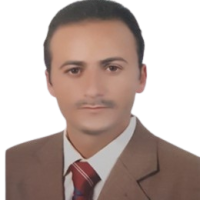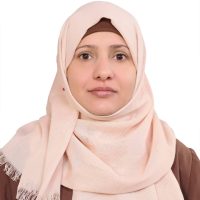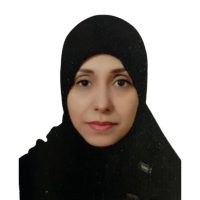
Amira Ali Al-Harethi
Personal data:
Name: Amira Ali Al-Harethi
Nationality: Yemeni
Place of birth: Sana’a, Yemen
Office: Biological Science department
Address: University of Sana’a, Yemen
Private: Political District, Djibouti Street, Sana’a
Address: Sana’a, Yemen.
Telephone: Mobile Phone: +967 777734136
Email: a.alharethi@su.edu.ye alharethi.amira@yahoo.com
Academic qualifications:
- Ph.D. Researcher in Nano-Biotechnology, Sana’a University, Yemen (December 2020)
- M.Sc. in Microbiology, Biological Science Dept., Faculty of Science, Sana’a University, Yemen (November 2013)
- M.Sc. Preliminary in Microbiology, Biological Science Dept., Faculty of Science, Sana’a University, Yemen (September 2011)
- B.Sc. in Microbiology, Biological Science Dept., Faculty of Science, Sana’a University, Yemen (December 2007)
- High School Diploma, Khawla Bint Al-Azwar School, Sana’a, Yemen (March 2002)
Working Experience:
- Teaching Assistant, Biological Science Dept., Faculty of Science, Sana’a University (Since September 2010
- Lecturer, College of Applied Medical Sciences, Sana’a University ( Since 2020)
- Trainer for graduate student courses in scientific research at Sana’a University (2014)
- Secretariat of Sana’a University Journal of Applied and Medical Sciences )2024(
- Responsible for the website of the Faculty of Science, Sana’a University (2024)
- Biology Teacher, IGCSE and A-level Curriculum, Al-Nahdh Modern School, American International School, Sana’a, Yemen.
Teaching activities:
- Demonstrator and teaching activities for practical courses:
- General Biology, Algae, Genetics, Biological Statistics, Bacteriology, Medical Microbiology, Aromatic Plant, and more.
- Teaching activities for theoretical courses:
- Biology for health science, Medical microbiology, Medical bacteriology, Mycology, Virology, and laboratory techniques.
Practical Experience :
- Proficient in preparation and characterization of nanomaterials.
- Isolation and identification of fungi especially “Phytophthora infestans”.
- Screening for enzymes and mycotoxins.
- Molecular biology techniques, Real-time PCR, ELISA and other skills as TLC and HPLC.
Internships:
| · Infectious diseases Online course, University of the people (2024)
· Nutrition Online course, University of the people (2024) |
| · What is Data Science? Online course, authorized by IBM (2020) |
| · Python for Genomic Data Science by Johns Hopkins University, Coursera (2020) |
| · Bioinformatic Methods I, Online course, University of Torontoand, Coursera (2020) |
| · Genomic Technologies in Clinical Diagnosis: Molecular Techniques, Online course, University of London, Future Learn (2020). |
| · Real-Time PCR, Arab Society of Stem cell and Molecular Biology, Giza, Egypt (2018). |
| · Writing in Science, Online course with honor, Stanford University, California, United States (2018). |
Publications:· Al-Harethi, A., Abdullah, Q. Y., & Al-Jobory, H. J. Phytophthora infestans Culture Media: A Comparative Study of Cost-Effective V8 Agar and Rye Agar. Sana’a University Journal of Applied Sciences and Technology.2024; 2, 103–106. · Al Harethi, A.A., Abdullah, Q.Y.M., Al Jobory, H.J. et al. First report of molecular identification of Phytophthora infestans causing potato late blight in Yemen. Sci Rep 13, 16365 (2023). https://doi.org/10.1038/s41598-023-43510-2 · Phytophthora infestans isolate Pi_Alharethi_YEM2021 internal transcribed spacer 1, partial sequence; 5.8S ribosomal RNA gene and internal transcribed spacer 2, complete sequence; and large subunit ribosomal RNA gene, partial sequence. NCBI, https://www.ncbi.nlm.nih.gov/nuccore/2417000057 · Abdullah Q, Mahmoud A and Al Harethi A. 2016. Isolation and identification of fungal post-harvest rot of some fruits in Yemen. PSM; (1):36-44. · Al Harethi A. 2016. Fruitsrottingfungiinrelationtoenzymesandmycotoxinsproduction.LAMPERTAcademic Publication.ISBN:978-3-659-81770-7. Germany. Achievement :Conducted pioneering research on the genetic characterization of specifically focusing on the first Yemeni isolate Phytophthora infestans and record valuable genetic data to NCBI GenBank, enhancing the understanding of, plant pathogen on my country. |
Volunteer Experience:
- Volunteered at Al-Shafaqa Institution for renal failure and cancer patients’ care since 2016
Activities:
- Organizer and coordinator of Frist Graduated Conference (2024).
- Trainer for graduate students: Free AI tools and apps in scientific research (2024)
- Director and lecturer in the scientific research workshop. faculty of science, Sana’a University (2023)
- Organizer and coordinator of the first Science Festival, Sana’a University (2022)
Additional Skills:
- Computer Skills: Microsoft Office, Mendeley, Prezi
- Languages: Arabic (Mother tongue), English (Excellent), German (Beginner)
- Hobbies: Writing poetry, landscape photography, planting ornamental trees, material recycling
Reference contact information:
- Dr. Ramadan A. Arafa
- Plant Pathology Research Institute, Agricultural Research Center, Giza, Egypt
- Mobile: +201030899852
- Email: Arafa.r.a84@gmail.com
- Dr. Khalid M. Naji
- Guest Scientist, Department of Chemical Ecology/Biological Chemistry, University of Konstanz, Germany
- Mobile: +49 15124 368683
- Email: khalid.2.naji@uni-konstanz.de
- Dr. Qais Yusuf Mohammed Abdullah
- Associate Professor of Microbiology, Biological Science Dep, Faculty of Science, University of Sana’a
- Mobile: +967-736583684
- Email: g.yusuf@su.edu.ye




